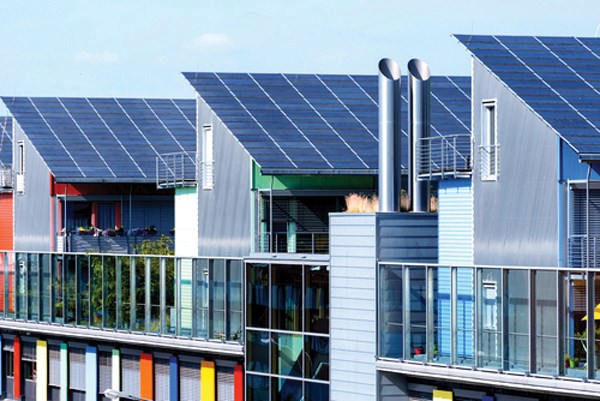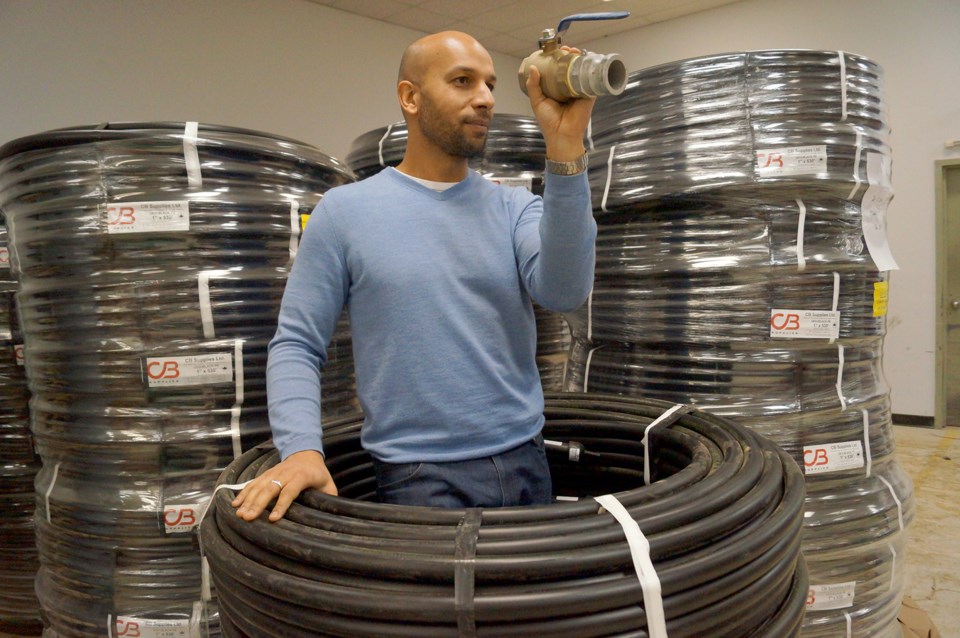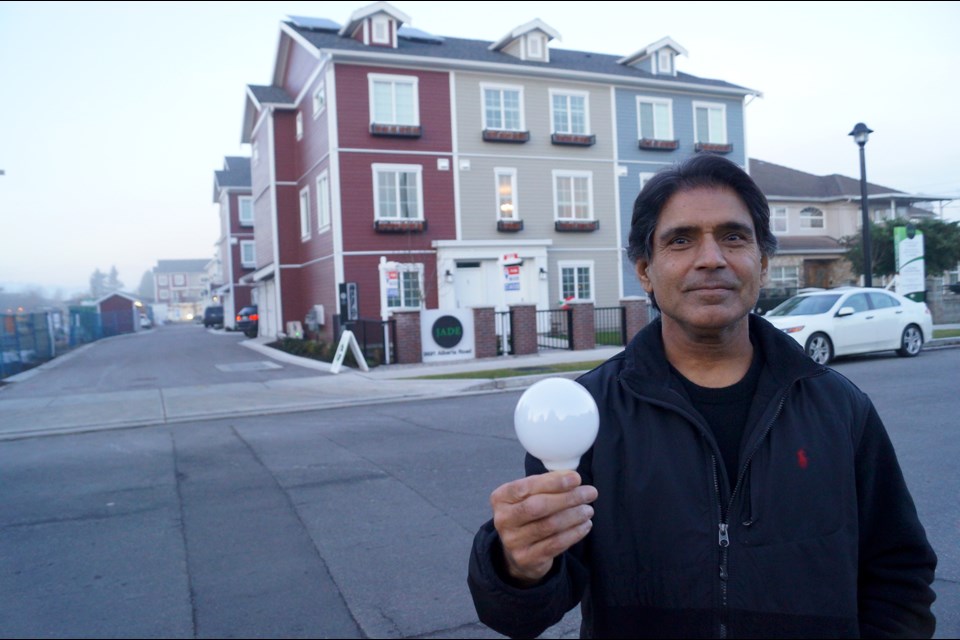It’s the first of its kind in Richmond and may very well be a sign of the not-too distant future.
Tien Sher Homes, the developer of the 24-unit Jade residential complex on Alberta Road, recently sold a townhouse with pre-installed photovoltaic (PV) solar panels.
But while new residents in Richmond buy up homes at a furious pace, they may not be buying into the Solar Revolution — just yet.
“What we found is people didn’t really appreciate the solar panels at the moment,” said Tien Sher president Charan Sethi.
According to Tien Sher sales manager Michael Barluk, the three-bedroom unit sold for $606,000, just $10,000 above the regular rate, or the cost of the panels themselves.
Tien Sher marketed a lofty annual energy cost savings of $1,500 per year for the unit.
As such, the panels would pay for themselves in about seven years, assuming BC Hydro’s projected power rates remain the same.
Buyer education needed
PV panels use light to generate electric current in semiconductors. Barluk said rolling the solar panels into the cost of the unit made little difference in monthly mortgage payments.
But at least three factors combined to prevent more PV panel homes from selling.
First, most of Jade’s homebuyers paid in cash, so the additional cost was immediate, instead of being spread out over mortgage payments.
Second, Sethi said he didn’t get the sense the homebuyers were purchasing the homes for long-term use. Third, homebuyers needed to be educated about the panels. “They basically thought we don’t get enough sun,” said Sethi.
Because photovoltaic panels convert light — not necessarily direct sunlight — into power, Metro Vancouver is a suitable region for PV panels. The region sees more sun than most of Germany, where solar energy accounts for nearly seven per cent of national energy production, according to various studies. European solar power production is far outpacing Canadian supplies, as well.

Political will lacking
“We were actually quite hyped about it and to move forward,” said Sethi.
Political will makes a difference, noted Sethi, pointing to a myriad of U.S. federal and state credits for developers and contractors.
The B.C. government recently axed the few solar credits it gave to developers and homeowners.
While the City of Richmond passed a bylaw in 2014 to ensure townhouses are solar hot water panel ready, it stopped short of a bolder photovoltaic panel bylaw; PV panels are more complicated to install. Nor did it consider going further to actually mandate them on new developments.
Prior to the election, the Richmond News asked prospective council members if they supported mandating solar panels on new developments. Re-elected members Mayor Malcolm Brodie and councillors Chak Au and Harold Steves said they did, while councillors Ken Johnston, Derek Dang, Bill McNulty and Linda McPhail said they did not. Newly elected Alexa Loo also said she supported solar panels, whereas Carol Day swung the other way toward a negative majority.
“Rather than use a stick approach and force (residents), I’d rather offer incentives and go from there and let it come about naturally,” said Day.
Nevertheless, according to John Irving, Richmond’s director of public works, the city is taking a hard look at installing millions of dollars worth of PV panels on the new Minoru pool.
If the city were to go further and make panels mandatory on new homes, Tien Sher’s Barluk said, in theory, it would be more cost effective and easier for developers to install them during construction.
Also, doing so may avoid strata council problems with future retrofits. That’s why Tien Sher made all of its other units at Jade photovoltaic ready — in case anyone changes their mind. Sethi said it wasn't much of a burden.
“Right now (the solar panel units are) suited for someone who’s maybe a little more green conscious,” added Barluk.
Guy Dauncey, communications director at the B.C. Sustainable Energy Association, echoes the opinions expressed by Tien Sher.
“The reason why solar panels haven’t taken off is: a) they’re still expensive, although prices are falling and; b) there are no tax breaks or incentives,” said Dauncey.
He notes solar PV panel installations currently cost $4 per watt (so a standard 4-kilowatt home system costs $16,000).
Economies of scale
Economies of scale are important as well. Where governments have taken a more active role in promoting sustainable energy, the costs are lower. Take Germany, for example, where residential rates are about $2.50 per watt. In Australia, panels cost as little as $1.50.
Dauncey accounts for interest on payments and installation costs, something Tien Sher did not as installation was rolled into construction and costs were rolled into the mortgage.
Dauncey says a realistic payback for a retrofitted solar panel system on an existing home with average consumption is about 15-20 years.
Dauncey notes if neighbours get together to install panels collectively, lower labour costs can bring overall costs down to $3 per watt.
Nevertheless, Dauncey is optimistic solar technology will soon bring costs down.
“Every single south facing roof in Richmond by 2030 will have solar panels. They will, because if they don’t, they’ll be losing money,” said Dauncey.
Warming to the geothermal task
Call it a tube-ular idea.
Geothermal energy is a process by which a building draws heat from and releases heat into the ground.
The technology and process has been around for decades, but it’s taken on a new lease on life over the past five years, especially in Richmond.
“Anyone owning a property or building a property for the long term needs to seriously look at geothermal as a heating and cooling source,” said Jeremy Jacob, an engineer at Richmond’s Geotility Geothermal Systems office.
A geo-exchange system works by heating and cooling water in underground pipes where the temperature is constant at 10 degrees Celsius.
In the summer, the system cools water warmed through the home’s ambient air. In the winter, cool water is warmed and resurfaced. Air is blown through hot or cold coils to provide heating and air conditioning, respectively. In any such system, additional electricity or gas is needed to reach optimal temperatures.
The energy is clean and renewable, perfect for the City of Richmond’s 2020 goal of reducing greenhouse gas emissions by 33 per cent below 2007 levels. The goal is subject to provincial and federal actions, however, but there’s a case to be made the city has the most to lose and most at risk as sea levels rise.
The final expansion of the city’s Alexandra District Energy Utility (ADEU), which uses a geothermal system, is set to begin and will soon service a new shopping centre, the Jamatkhana Temple and four new residential developments in addition to three existing ones.

Density matters
Meanwhile, new condo buildings in the Oval Village area will soon be hooked up to a geothermal system that uses sewer heat. The city also claims it’s looking at a geothermal system for Capstan Village.
“It’s sometimes hard to get geothermal off the ground in this province because, generally, we have really cheap gas and electricity,” said John Irving, Richmond’s director of engineering and public works. “To make it work, generally, you need high density. Your bang for buck becomes much greater when you can concentrate the energy,” said Irving.
Together, the two planned systems form a new city-run corporation, the Lulu Island Energy Company. Said to be self-sustaining, the city expects to pay off the $23.3 million ADEU portion in 18 years by selling the energy to residents at or below market rates (it could be paid off earlier if market rates increase).
The goal is a 60-70 per cent diversion of energy used to heat and cool homes.
Schools lead the way
The Richmond School District has also taken on geothermal initiatives. Steveston-London secondary, which has a geothermal system, is reporting a 25 per cent saving in energy usage compared to other high schools. More impressive is Brighouse elementary, which has reduced its natural gas usage by 90 per cent and overall energy usage by 58 per cent since its 2011 rebuild.
Jacob says a home can save up to 70 per cent off its typical home energy use. But to retrofit an existing home costs about $25,000, so it makes more sense to install the system before the foundation is laid. A typical system could pay itself off in 20 years, he added.
Jacob says society is conflicted in how it’s embracing renewable energy.
“What we see on the West Coast is really leading the globe in terms of adoption of higher standards for building code, for energy code,” he said.
“But what we’re really lacking is vision and leadership at the provincial and federal levels,” he added, noting there are no subsidies in place for geo-exchange systems.
“It’s mind boggling,” he said.
On Monday, Richmond City Council agreed to send a letter of support to the Peace River town of Hudson’s Hope, which is asking for a moratorium on the proposed Site C hydroelectric dam, to further study the energy needs of the province and take a closer look at alternative solutions.
But Jacob notes things could be better.

Ban baseboard heaters
“I really applaud the municipal governments on those fronts,” but “If they’re serious about opposing Site C, then they need to take a serious look at banning baseboard heaters. There’s a lot of new buildings using those,” he said.
Last fall, the city passed new energy efficiency guidelines for new homes. Projects must now meet an EnerGuide 82 rating — one above provincial standard — although developments can still utilize electric heaters.
“Using electricity for heat is really inefficient. It’s crazy really to use electricity for heat,” acknowledges Irving.
Vancouver is proposing EnerGuide 84 ratings. Other cities in Canada have done so, as well. Richmond council weighed the considerations of developers represented by the Urban Development Institute, which cited costs.
Jacob said a geo-exchange system bolsters the home’s value (effectively paying for itself right off the bat).
All-in-all, Jacob said for now, geothermal users are bright-eyed environmentalists, with money to spend.
“If your criteria for obtaining this system are strictly dollars and cents, you’re probably not going to do this. Typical buyers have other motivations, such as the environment,” said Jacob.
“For the longest time the attitude in North America was let’s wait on climate change and see. This is not visionary enough if we want to arrest climate change,” he concluded.



